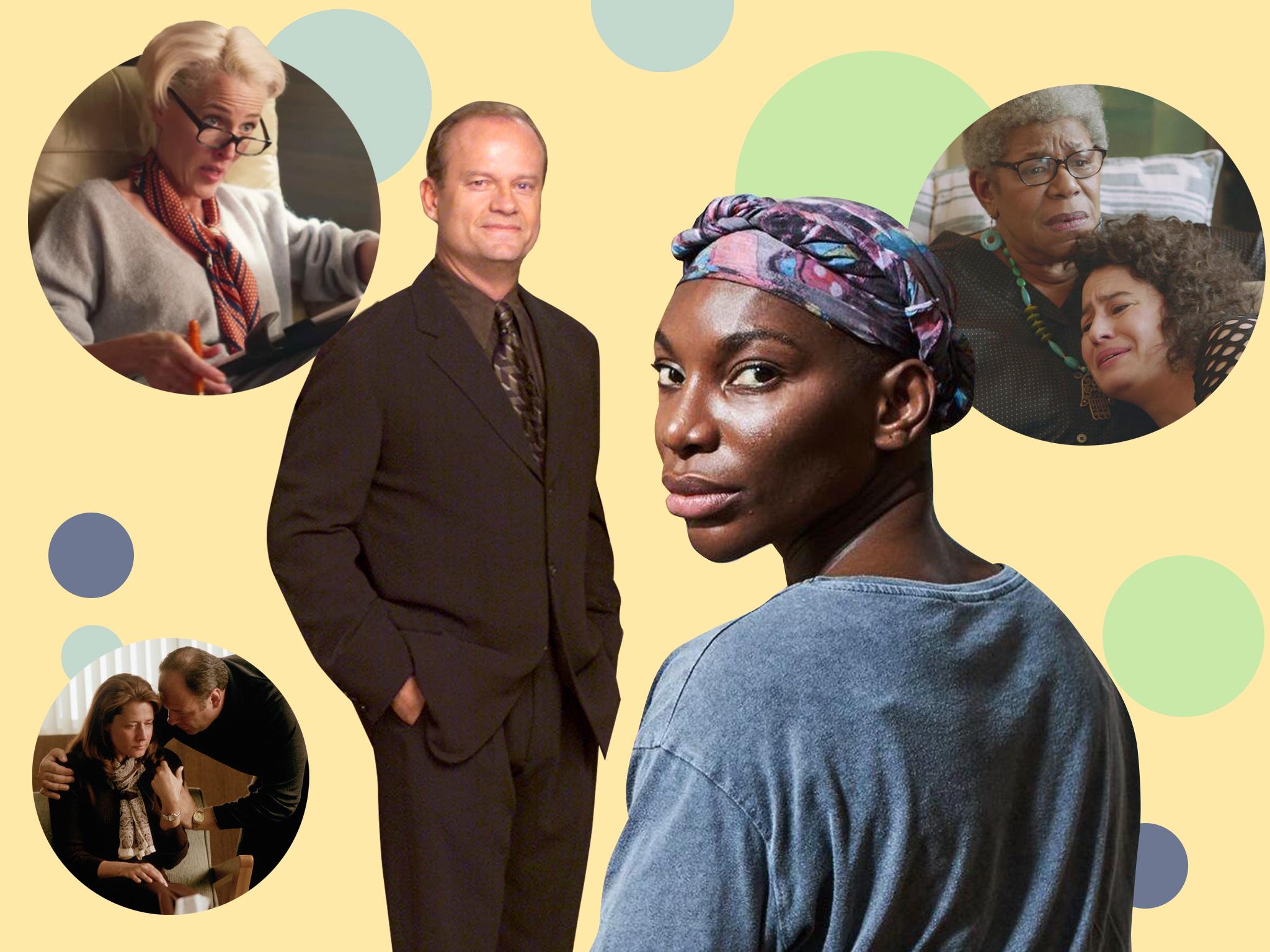Analyse this: Why is therapy on TV so far-fetched?
From 'I May Destroy You' to 'Sex Education', depictions of therapy onscreen range from daft to downright immoral. Our new arts columnist Micha Frazer-Carroll won’t take it lying down


Your support helps us to tell the story
From reproductive rights to climate change to Big Tech, The Independent is on the ground when the story is developing. Whether it's investigating the financials of Elon Musk's pro-Trump PAC or producing our latest documentary, 'The A Word', which shines a light on the American women fighting for reproductive rights, we know how important it is to parse out the facts from the messaging.
At such a critical moment in US history, we need reporters on the ground. Your donation allows us to keep sending journalists to speak to both sides of the story.
The Independent is trusted by Americans across the entire political spectrum. And unlike many other quality news outlets, we choose not to lock Americans out of our reporting and analysis with paywalls. We believe quality journalism should be available to everyone, paid for by those who can afford it.
Your support makes all the difference.At the emotional climax of I May Destroy You’s ninth episode, I came across a distraction that I couldn’t stop thinking about. It takes place in the middle of a night out, when protagonist Arabella finds herself on the brink of a crisis and shows up at what appears to be her therapist’s house for an impromptu midnight session. “Night-time therapy?” I thought, half-expecting the scene to quickly reveal itself as some sort of metaphor, hallucination or dream sequence. But it wasn’t. Who’s out here getting therapy in the middle of the night? Where are the boundaries?
At some point in the scene, there is a faint acknowledgement that this is unusual – Arabella apologises for “turning up”, to which her therapist responds that that’s what the “emergency line” is for. This struck me as incredibly odd. Yes, in very rare cases it might be possible that therapists would allow this kind of emergency session (distinct from crisis lines). But make no mistake, in the context of the real world, rocking up at your therapist’s house in your Halloween costume after a failed night out would be highly, highly unusual.
It might sound like a petty pet peeve but whenever I see this sort of thing on TV, it makes me shout at the screen. As someone who’s had a lot of therapy, has a therapist for a mum, studied psychology and has worked in a welfare role, I get annoyed when I see wonky, misleading depictions of therapy in pop culture – and I May Destroy You certainly isn’t the only offender.
Last year, Insider published a definitive ranking of TV therapists, “from least likely to most likely to ruin their patients’ lives”. Guided by the opinions of real-life therapists, prestige drama The Sopranos fares the best of the 16 representations the ranking assesses – in part, because therapists felt that the show gets down to the nuts and bolts of therapy, showing key practises like boundary-setting (which was clearly absent in I May Destroy You’s midnight rendez-vous).
For me, the Nineties American sitcom Frasier, which follows the lives of two psychiatrist brothers, was one of my own weird childhood favourites, partly because I was interested in the ways it realistically portrayed therapy. Yes, it still took creative license and often tried to make comedy out of psychology and psychiatry. It also loved a joke about Freud. But lots of episodes flesh out the moral and ethical conundrums that both therapists and clients can be presented with in the process. This is also what I loved about the 2005 movie Prime, where Meryl Streep plays a therapist caught in a moral bind when she discovers her client is dating her son.
Other sitcoms have attempted to address how ethics comes into the therapy room too, but clumsily and unrealistically. In How I Met Your Mother, there’s a whole plotline where news anchor Robin Scherbatsky ends up dating her therapist. This plotline also gets touched upon in Sex Education, where protagonist Otis’s sex therapist father cops off with a client during a session. Transference, a phenomenon whereby clients can transfer and project feelings – and in some cases develop an attraction – towards their therapist isn’t an uncommon phenomenon, but romantic or sexual relationships between a therapist and client are deeply immoral and violate just about every code of ethics that there is.
Beyond these serious offenders, there are the subtler tropes and overplayed representations of therapists on TV. By the mid 20-teens, the “black lady therapist” had become such a popular archetype in both American and British TV that Slate signal blasted it as an official new pop culture trend. In a jazzed-up version of the tired black best friend/black mother figure trope, black women do the emotional heavy lifting as mental health practitioners in a staggering number of shows, including Normal People, Crazy Ex-Girlfriend, Broad City, Insecure, Grace and Frankie, Wanderlust and of course I May Destroy You. This form of typecasting is particularly frustrating because, as any black person who has tried to find a black therapist already knows, it’s actually quite hard to do; black people are underrepresented in the profession, which is why initiatives like the Black, African and Asian Therapy Network exist.
Then there are the small, logistical things that can add up to make therapy look misleading. I’ve always been struck by how directive therapists seem to be on TV (attacking people’s personalities in the first session, or advising characters that they dump their boyfriends), when most talking therapy opts for an approach that is non-judgemental, non-directive and more client-led, where you do the majority of the talking. In most therapy, you also don’t get to lie down. Many popular types of therapy don’t involve your therapist taking notes during the session. And, if your therapy is private, no one on TV shows the awkward bit where you have to hand over the cash at the end of a session (which is usually 50 minutes by the way, not an hour).
When I wrote about the depiction of police on TV earlier this month, one rebuttal I received more than once was the need to make distinctions between fact and fiction: TV shows and films aren’t supposed to reflect real life with perfect accuracy (and they would probably be a lot less fun to watch if they did). I don’t dispute this, but crucially, I am still interested in unpacking how the fictional stories we’re exposed to on screen genuinely do shape our perceptions of the “real world”. This is just as important when it comes to telly “shrinks”; only about 28 per cent of Britons have ever gone to therapy themselves (in comparison to 42 per cent of Americans), so the vast majority of the population likely borrows its perception of therapy from pop culture.

Watch Apple TV+ free for 7 days
New subscribers only. £8.99/mo. after free trial. Plan auto-renews until cancelled

Watch Apple TV+ free for 7 days
New subscribers only. £8.99/mo. after free trial. Plan auto-renews until cancelled
For therapy newcomers, some misconceptions might make all the difference regarding whether they give therapy a try, or how satisfied they are with their therapist. For example, when I was doing research for this piece, many people told me that they expected there would be more “lightbulb” or “eureka” moments in their sessions – another trope that often drives narrative arcs on television. Some also mentioned that when they got therapy, they expected their therapists to dispense advice and wisdom like all-seeing oracles (something of which my fave Frasier is still sometimes guilty). And others still lamented how, on TV, you never see long waiting lists for therapy on the NHS, or the long, trial-and-error task of finding a therapist you vibe with.
In my first ever therapy session – an “assessment” where both I and my therapist got a feel for each other – I remember them asking what I thought the purpose of therapy was. Five years later, I can’t help but think how crucial that question is, particularly in light of all the ways that the process differs from what TV might have you believe. Without her clarification, who knows, maybe I would have been showing up on my therapist’s doorstep at midnight, too.
Join our commenting forum
Join thought-provoking conversations, follow other Independent readers and see their replies
Comments